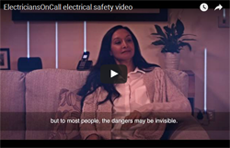What is Part P?
What is Part P of the building regulations?
Since 2005, all electrical work in dwellings in England and Wales whether carried out professionally or as DIY, and whether or not the work is notifiable to a building control body (see below), must meet the requirements of Part P of the Building Regulations. In April 2013 the requirements for England were amended. These regulations were further amended in 2015.
Compliance with Part P is intended to keep you and your family as safe as possible from electrical hazards.
The requirements of Part P apply to new dwellings and to any alterations or additions to the electrical installations of existing dwellings, including full or partial rewires.
Part P states that anyone carrying out electrical work in a dwelling must ensure that reasonable provision has been made in the design and installation of the electrical installations in order to protect any persons who might use, maintain or alter the electrical installation of that dwelling from fire and injury, including electric shock.
Who is responsible for making sure that electrical work in your home meets the
requirements of Part P?
By law, the homeowner or landlord must be able to prove that all electrical installation work meets Part P, or they will be committing a criminal offence.
Local authorities have the power to make homeowners or landlords remove or alter any work that does not meet the requirements of the Building Regulations.
What electrical work is notifiable?
From 2016 electrical work in a dwelling, or associated with its surroundings, is notifiable to a local building control body where the work includes:
The installation of a new circuit, whether at low voltage (typically 230 V) or extra-low voltage);
The replacement of a consumer unit (fusebox); or• any alteration or addition to an existing circuit in a special location*, whether at low voltage (typically 230 V) or extra-low voltage
*(A special location is a room containing a bath, shower, swimming pool or a sauna heater).
An alteration or addition to an existing circuit in a room containing a bath or shower is notifiable only where carried out in the space surrounding a bath or shower.
An alteration or addition anywhere within a room containing a swimming pool or sauna heater is notifiable.
What do I need to do before electrical installation work can be carried out in my home?
You must first check whether the work is notifiable. If it is, then you must either;
Employ an electrician who is registered with one of the Government-approved scheme providers; or tell (‘notify’) your local-authority building-control about the installation work and seek their permission before work begins.
The benefits of using a registered electrician such as ElectriciansOnCall
We strongly recommend that you use an approved registered electrician such as ElectriciansOnCall to carry out any electrical work in or around your home.
If you use ElectriciansOnCall, you can expect to have safe electrical installation work done, as the work will meet the UK national standard, BS 7671 (Requirements for Electrical Installations).
You will not have to deal with building control directly and when the work is finished you should receive an Electrical Installation Certificate or, where applicable, a Minor Electrical Installation Works Certificate that confirms the work meets BS 7671; and a Building Regulations Compliance Certificate that confirms the work meets the Building Regulations. All new installation work carried out by us will be covered under a 6 year, insurance backed guarantee for total peace of mind
What if I don’t use a registered electrician or decide to do the work myself.
You may have problems selling your property if no Part P certificate has been lodged with your local authority for any notifiable work. Should the worst happen and your property experiences an electrical fire it will be investigated by a fire investigator, should badly installed or dangerous issues be found within the electrical installation your insurance company could refuse to pay your claim.
If you have any questions regarding Part P of the building regulations or a general enquiry regarding your electrical installation contact your local office today.

